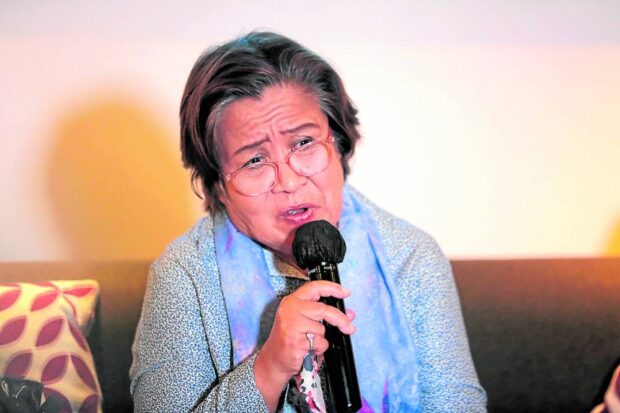Probe ex-cop’s claim Duterte is ‘lord of all drug lords’ – De Lima
MANILA, Philippines — Former Sen. Leila de Lima has urged authorities to launch a “serious and immediate investigation” into the allegations of retired police officer and confessed hired gun Arturo Lascañas describing former President Rodrigo Duterte as “the lord of all drug lords in the southern Philippines.”
In a series of tweets, the former senator, who was freed on bail last month and is facing the last of three drug charges, said it was the height of irony that Duterte, who launched the bloody war on drugs during his administration, would turn out to be a protector of illegal drug syndicates himself, as alleged by Lascañas in a Vera Files report.
“All this time, Duterte has taken the Filipino people for a ride, big time!” De Lima said in a mix of English and Filipino.
“[He launched a] war on drugs supposedly, but he ordered thousands killed, and even had the audacity to promise three-to-six months [of solving the drug menace], yet it turns out he was the one involved and running drug syndicates,” De Lima said, citing Lascañas’ claims in the Nov. 30 piece by columnist Antonio J. Montalvan II.
‘Explosive’
“This explosive revelation from former Davao policeman and self-confessed Davao Death Squad (DDS) hit man Arturo Lascañas warrants serious and immediate investigation,” she said.
Article continues after this advertisement“With the number of those killed and the depth of deception of Duterte, they cannot sweep this under the rug. Indeed, truth has a way of finding the light of day,” she said.
Article continues after this advertisementDe Lima, who investigated alleged drug killings of the so-called Davao Death Squad under Duterte, said it appeared that the charges against her were only a distraction.
“There weren’t any legitimate big-time drug lords who were caught because they were being protected as their associates,” she said.
In the Vera Files report, Lascañas, who had testified in the Senate and submitted affidavits in the International Criminal Court (ICC) in the complaint for crimes against humanity against the former President, said Duterte owned or had access to a laboratory for “shabu” or crystal meth.
He claimed that one shabu laboratory was located in Barangay Dumoy in Davao City, disguised as a canned fish factory.
Deliveries
Lascañas said he also saw Duterte’s former economic adviser, Chinese businessman Michael Yang, outside the cannery. “We delivered to the Toril Fishport more than three times. It was all drugs… shabu,” he said in the interview with Montalvan in an undisclosed country.
Duterte is facing an investigation by the ICC for the thousands of lives claimed by his war on drugs during his tenure as Davao mayor and as president.
In March 2018, the Philippines pulled out of its membership in the Rome Statute, the ICC’s founding document, on orders of Duterte after the ICC prosecutor’s office launched an initial inquiry into alleged extrajudicial drug killings in the Philippines.
The withdrawal took effect in 2019, although it did not stop the ICC investigation.
But the possibility of the country’s return to the ICC has been gaining traction after the House of Representatives entertained measures urging the government to allow ICC prosecutors to proceed with their investigation into Duterte’s drug war.
Last month, Mr. Marcos suggested that he was open to the possibility of rejoining the ICC. But he also said a thorough review was needed first.
Prudent move
Sen. Francis Escudero said the President was only being prudent in order to spare the Philippines from any unnecessary suffering.
Interviewed on dzBB radio on Sunday, the senator said Mr. Marcos’ call for a review of the prospect of returning to the fold of the ICC was the wise course of action, considering “there are treaties we entered [into] which we ended up paying for and suffering from.”
Escudero cited the Philippines’ accession to the Paris-based Financial Action Task Force (FATF), an intergovernmental organization established in 1989 on the initiative of the Group of Seven or G7 countries to develop policies to combat money laundering.
“We joined that, which is why we got blacklisted,” he said, noting that as of 2022, the Philippines remains on the “gray list” of FATF, as a result of the country’s alleged failure to resolve “strategic inadequacies in countering money laundering, terrorist and proliferation financing.”
“This is the reason that the President should review [the option of rejoining] the ICC. What would our country benefit if we rejoined?” Escudero said.
